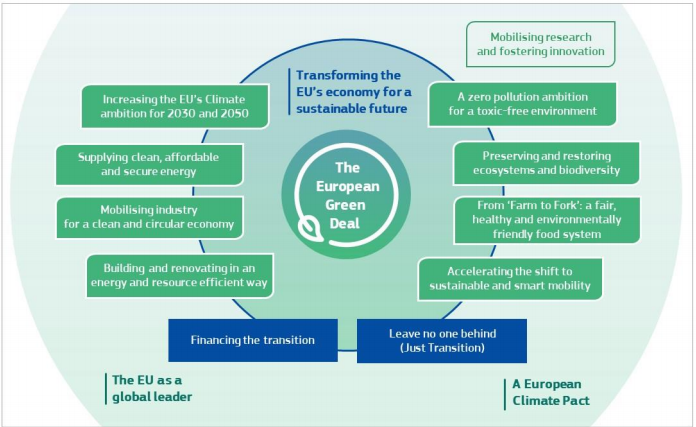
The European Green Deal will make EU’s economy more sustainable by turning climate and environmental challenges into opportunities across all policy areas and making the transition just and inclusive for all. As the logic continuation of the roadmap towards a net zero Union with a modern, resource-efficient and competitive economy, three initiatives have been recently approved in March.
The EU Climate Law reaffirms the EU commitment and ambition defined in the “European Green Deal Strategy “ and “A Clean Planet for All” long-term strategies, in alignment with the Paris Agreement objectives. The main aim is to tackle climate change by reducing C02 and GHGs, limiting the global warming to below 1.5 °C, and achieve climate neutrality (net zero) by 2050 with the EU as global leader of green policies. The adoption of a European Climate Pact will allow all parts of society to jointly cooperate for the climate-neutrality achievement.
A New Industrial Strategy for Europe is setting a comprehensive strategy aiming to boost the EU industry towards a faster and sustainable climate-neutrality process. According to the strategy, three drivers will transform the EU industry, supporting the small and medium-sized enterprises (SMEs), enhancing the single market structure and rules while keeping Europe sustainable and competitive:
- the Green transition, with the European Green Deal being Europe’s new growth strategy securing supply of affordable energy and (critical) raw materials;
- the Digital transition, which allows industry and SMEs to be more proactive, provides workers with new skills, and supports decarbonisation of our economy. Innovation and technologies (space,e-mobility, batteries, renewable energies, pharmaceuticals, aerospace, defence and digital applications) will be the backbone of the strategy and will be embedded in the EU policy making process.
- competitiveness on the global stage, where Europe must leverage the impact of its single market to set global standards with a Single Market Enforcement Action Plan.
In the course of the same month, the new Circular Economy Action Plan was adopted by the EU Commission as part of the Industrial strategy. The action plan presents new initiatives along the entire life cycle of products in order to modernise and transform the EU economy while protecting the environment. It is driven by the ambition to make sustainable products, with high-level design and features that last and to enable our citizens to take full part in the circular economy and benefit from the positive change that it brings about.
